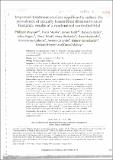| dc.contributor.author | Mumtaz, Zubia | |
| dc.contributor.author | Salway, Sarah | |
| dc.contributor.author | Nyagero, Josephat | |
| dc.contributor.author | Osur, Joachim | |
| dc.contributor.author | Chirwa, Ellen | |
| dc.contributor.author | Kachale, Fannie | |
| dc.contributor.author | Saunders, Duncan | |
| dc.date.accessioned | 2021-08-23T20:27:44Z | |
| dc.date.available | 2021-08-23T20:27:44Z | |
| dc.date.issued | 3/24/2016 | |
| dc.identifier.citation | : Mumtaz Z, Salway S, Nyagero J, et al. Improving the Standards-Based Management-Recognition initiative to provide highquality, equitable maternal health services in Malawi: an implementation research protocol. BMJ Global Health 2016;1:e000022. doi:10.1136/bmjgh-2015- 000022 | en_US |
| dc.identifier.uri | http://repository.amref.org/handle/123456789/127 | |
| dc.description | This is an Open Access article distributed in accordance with
the Creative Commons Attribution Non Commercial (CC BY-NC 4.0) license,
which permits others to distribute, remix, adapt, build upon this work noncommercially, and license their derivative works on different terms, provided
the original work is properly cited and the use is non-commercial. See: http://
creativecommons.org/licenses/by-nc/4.0 | en_US |
| dc.description.abstract | Background: The Government of Malawi is seeking
evidence to improve implementation of its flagship
quality of care improvement initiative—the Standards
Based Management-Recognition for Reproductive
Health (SBM-R(RH)).
Objective: This implementation study will assess the
quality of maternal healthcare in facilities where the
SBM-R(RH) initiative has been employed, identify
factors that support or undermine effectiveness of the
initiative and develop strategies to further enhance its
operation.
Methods: Data will be collected in 4 interlinked
modules using quantitative and qualitative research
methods. Module 1 will develop the programme theory
underlying the SBM-R(RH) initiative, using document
review and in-depth interviews with policymakers and
programme managers. Module 2 will quantitatively
assess the quality and equity of maternal healthcare
provided in facilities where the SBM-R(RH) initiative
has been implemented, using the Malawi Integrated
Performance Standards for Reproductive Health.
Module 3 will conduct an organisational ethnography
to explore the structures and processes through which
SBM-R(RH) is currently operationalised. Barriers and
facilitators will be identified. Module 4 will involve
coordinated co-production of knowledge by
researchers, policymakers and the public, to identify
and test strategies to improve implementation of the
initiative.
Potential impact: The research outcomes will
provide empirical evidence of strategies that will
enhance the facilitators and address the barriers to
effective implementation of the initiative. It will also
contribute to the theoretical advances in the emerging
science of implementation research. | en_US |
| dc.description.sponsorship | Global Affairs Canada, Canadian
Institutes of Health Research and International Development and Research
Centre, Canada, under the Innovating Maternal and Child Health Program,
Africa | en_US |
| dc.language.iso | en | en_US |
| dc.publisher | BMJ Global Health | en_US |
| dc.subject | Malawi | en_US |
| dc.subject | Standards Based Management-Recognition for Reproductive Health (SBM-R(RH)) | en_US |
| dc.subject | Policymakers | en_US |
| dc.subject | Programme managers | en_US |
| dc.subject | Reproductive Health | en_US |
| dc.subject | Ministry of Health (MOH) | en_US |
| dc.subject | Emergency obstetric care (EmOC) | en_US |
| dc.title | Improving the Standards-Based Management-Recognition initiative to provide high-quality, equitable maternal health services in Malawi: an implementation research protocol | en_US |
| dc.type | Article, Journal | en_US |


